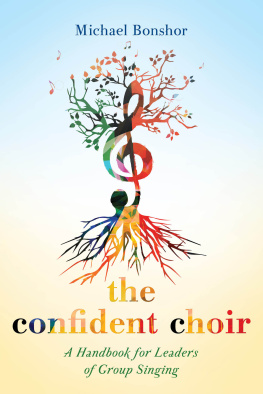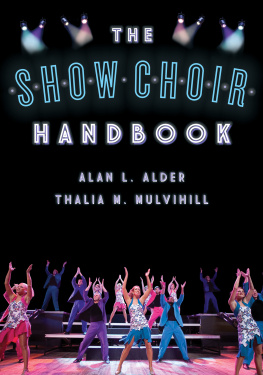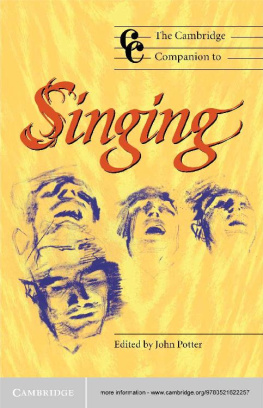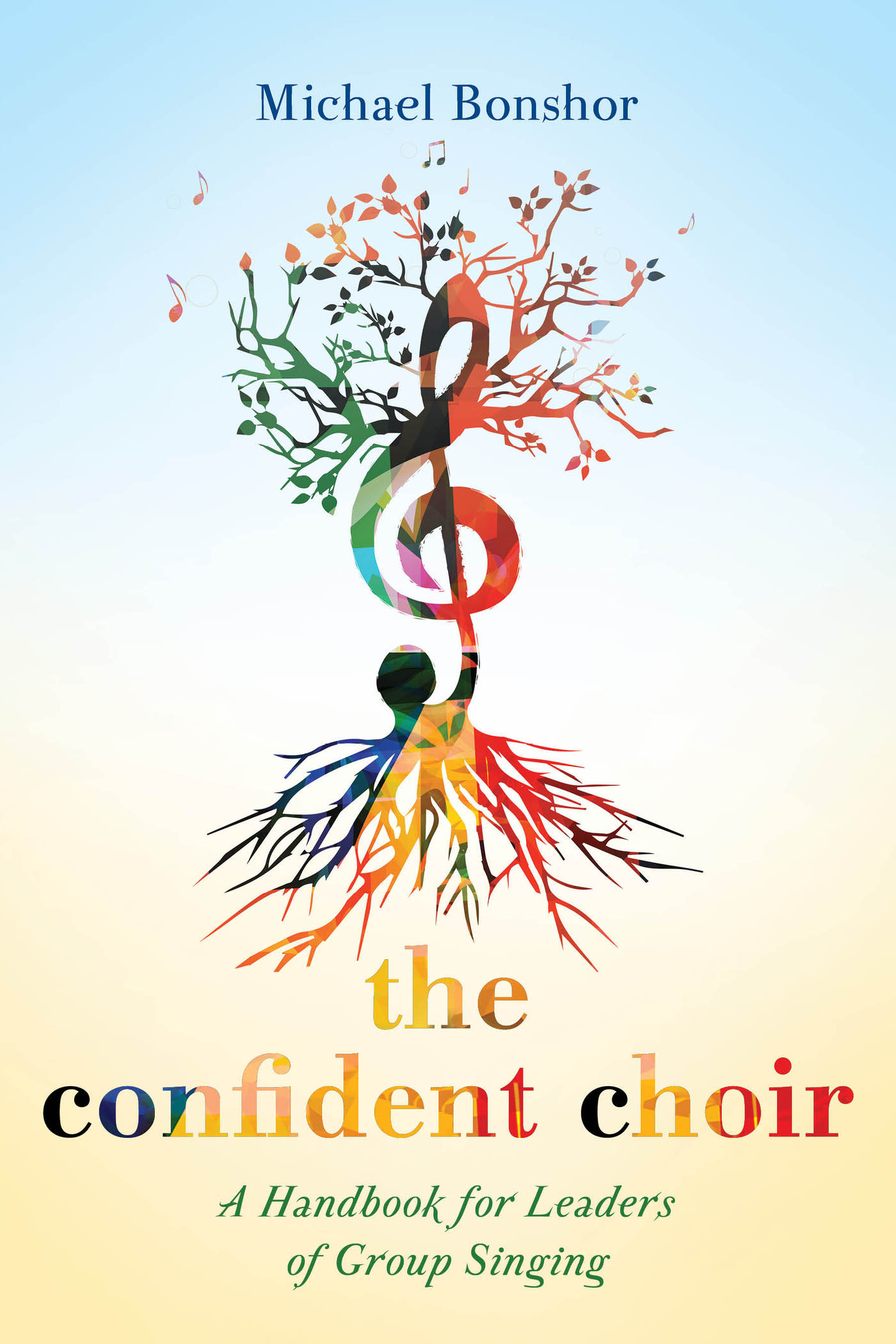The Confident Choir
The Confident Choir
A Handbook for Leaders of Group Singing
Michael Bonshor
ROWMAN & LITTLEFIELD
Lanham Boulder New York London
Published by Rowman & Littlefield
A wholly owned subsidiary of The Rowman & Littlefield Publishing Group, Inc.
4501 Forbes Boulevard, Suite 200, Lanham, Maryland 20706
www.rowman.com
Unit A, Whitacre Mews, 26-34 Stannary Street, London SE11 4AB
Copyright 2018 by Rowman & Littlefield
All rights reserved. No part of this book may be reproduced in any form or by any electronic or mechanical means, including information storage and retrieval systems, without written permission from the publisher, except by a reviewer who may quote passages in a review.
British Library Cataloguing in Publication Information Available
Library of Congress Cataloging-in-Publication Data
Names: Bonshor, Michael, author.
Title: The confident choir : a handbook for leaders of group singing / Michael Bonshor.
Description: Lanham : Rowman & Littlefield, [2018] | Includes bibliographical references and index.
Identifiers: LCCN 2017035627 (print) | LCCN 2017035670 (ebook) | ISBN 9781538102800 (electronic) | ISBN 9781538102787 (cloth : alk. paper) | ISBN 9781538102794 (pbk. : alk. paper)
Subjects: LCSH: Choral singingInstruction and study. | Choral conducting.
Classification: LCC MT875 (ebook) | LCC MT875 .B66 2018 (print) | DDC 782.5/14dc23 LC record available at https://lccn.loc.gov/2017035627
 TM The paper used in this publication meets the minimum requirements of American National Standard for Information Sciences Permanence of Paper for Printed Library Materials, ANSI/NISO Z39.48-1992.
TM The paper used in this publication meets the minimum requirements of American National Standard for Information Sciences Permanence of Paper for Printed Library Materials, ANSI/NISO Z39.48-1992.
Printed in the United States of America
Preface
I think its amazing how a really good musical director can lift you onto a level you never thought for a minute that you could achieve, and thats such a fantastic feeling... just that theres somebody there that youre putting your confidence into.
Dawn
The above quotation encapsulates the impact that a leader of group singing activities can have upon amateur performers. Dawn was one of the singers that I interviewed during a research project that was inspired by over three decades of working with people who sing together. As a conductor and singing teacher, I have met many singers like Dawn, who value the trust and rapport that can develop between a choir and their musical director. As a comparatively late-blooming researcher, I have made it my mission to find out how those of us who regularly wave our arms around in front of amateur singers can encourage them to have confidence in us as their conductors, and to develop confidence in themselves as performers.
This book is designed to be helpful to anyone who conducts, or wants to conduct, adult amateur choirs of any kind. It will also be of interest to anyone who participates in group singing activities, and students of group dynamics in choral performance. It includes a thorough exploration of some of the factors affecting confidence levels in amateur choral singers; it creates an accessible synthesis of some of the psychological models of confidence and relates them to the choral context; and it offers practical confidence-building strategies for conductors, teachers, community musicians and workshop leaders. Each chapter contains original research data, first-hand insights into the perspectives of choral singers, links to psychological and philosophical frameworks, and suggestions for the application of these concepts. There are also real-life case studies, practical exercises, hints and tips for conductors, and a series of handy checklists and reminders.
Some of this material is based on my own experience, acquired during a longstanding career of working with singers of all ages, abilities, and musical interests. However, much of the content is also derived from my more-recent empirical research career. Some of the findings have reflected my observations as a singer, teacher, and conductor; other results have been more unexpected and thought-provoking. My original research aims were to explore the lived experience of choral singers; to identify some of the main influences on their perceptions of their voices and performance ability; and to highlight some of the factors affecting their confidence as singers. The ultimate objective is to provide a set of useful recommendations for musical leaders with an interest in maximizing confidence in choral ensembles.
Throughout the text, precedence is given to the voices of the singers; we hear directly from them about their thoughts, opinions, perceptions, and feelings about the process of singing together. This book is about how amateur singers engage in group singing activities, and how conductors and other musical leaders can help them to optimize their enjoyment of choral participation. It focuses on the philosophy, pedagogy, and practice of developing confident and competent choral singers. The principal themes include verbal and nonverbal communication; group dynamics; collaboration and peer learning; musical leadership and group facilitation; practice and preparation; and environmental factors, such as the effects of acoustics on singers perceptions of their own performances.
I hope that there will be something useful here for every leader of group singing activities, regardless of their background, training, or experience. There are probably as many routes to becoming a conductor of an amateur choir as there are individuals in this position. Some leaders of group singing may have studied conducting as part of their academic education, but there are also many excellent and charismatic self-made conductors who have received comparatively little formal training. Musicians often become choir conductors by accident rather than design, and the reasons for this are myriad. Some composers conduct because they prefer to lead performances of their own choral works rather than delegating this to a full-time professional conductor. Church organists and school music teachers are usually expected to conduct choirs, regardless of whether they have any desire for, or experience of, choral leadership. Rehearsal pianists are sometimes co-opted to the role of conductor to cover for absences, and some may subsequently develop their own career in choral conducting. Some singers end up conducting their own amateur groups due to a shortage of trained conductors, or perhaps due to a sense of vocation.
The evolution of a choral conductor has some parallels with the development of a singer. Conductors and singers work with their own physical, intellectual, and emotional resources, as well as with their musical knowledge and skills, and, of course, their unique voices. Also, as with dedicated vocal practice, much of the preparatory work of becoming a conductor is often carried out alone, with limited opportunities for obtaining constructive feedback before stepping out into the limelight. Moving from the discipline of studying scores and practicing gestures in splendid isolation to standing in front of a group of real live singers can be a daunting experience, for which it is almost impossible for many conductors of amateur groups to prepare. The reality of publicly honing the skills and mustering the resources required to lead a musical ensemble can be a sobering experience at times. Even for experienced conductors, the process of learning to fill this role never ends; I have found that the more I learn, the more I realize I need to learn! One of the purposes of this book is to provide support and guidance for anyone who finds themselves in this position.
Next page









 TM The paper used in this publication meets the minimum requirements of American National Standard for Information Sciences Permanence of Paper for Printed Library Materials, ANSI/NISO Z39.48-1992.
TM The paper used in this publication meets the minimum requirements of American National Standard for Information Sciences Permanence of Paper for Printed Library Materials, ANSI/NISO Z39.48-1992.